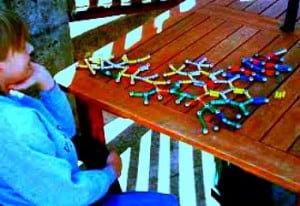
Number of genes associated with autism quadruples.
Research in the genetics of autism spectrum disorder (ASD) just took a giant leap forward. In a coordinated effort, led in part by scientists at the University of California – San Francisco (UCSF), 50 laboratories worldwide worked to decode the genetics of autism. The new studies suggest that dozens of genes impact the development of ASD. The genes affect key brain areas in communication and certain aspects of cell production. These findings could help scientists understand exactly how autism is caused.
Several groups of scientists worked on this research. The scientists analyzed existing data from genetic databases. One group used data from the Simons Simplex Collection (SSC), a repository of DNA created by the Simons Foundation Autism Research Initiative. The SSC contains genes from families in which at least one child has ASD and the parents are unaffected. The other group of researchers worked with the Autism Sequencing Consortium (ASC), which is supported by the National Institute of Mental Health. The ASC helps researchers collaborate on large genomic studies in autism.
Based on their research, the scientists identified when genetic mutations take place and what type of mutations are commonly related to ASD. The majority of mutations are de novo, meaning that the mutations are not inherited from the parents. De novo mutations appear spontaneously in a single sperm or egg cell just before conception. The scientists grouped the mutations they discovered into three general types. They considered mutations that:
- Affect the formation of synapses. These mutations impact the brain’s networking and communication abilities.
- Regulate how the instructions in DNA are sent to cells’ protein-making machinery.
- Alter how DNA is packed into cells. These mutations can affect gene expression, which means that many genes could be impacted by only one change.
This research brings the total number of genes strongly associated with ASD from 11 to approximately 50. Having identified more genes related to ASD, researchers can more accurately identify other genes associated with autism, examine what specifically these genes affect, and begin developing treatments.
“There has been a lot of concern that 1,000 genes means 1,000 different treatments, but I think the news is much brighter than that. There is already strong evidence that these mutations converge on a much smaller number of key biological functions. We now need to focus on these points of convergence to begin to develop novel treatments,” explained Matthew Slate, MD, PhD, chair and Oberndorf Family Distinguished Professor in Psychiatry at UCSF.
This research is published in the journal Nature.
Previous news in autism:



 © 2025 Unyte Health US Inc.
© 2025 Unyte Health US Inc.